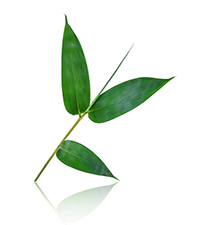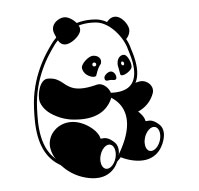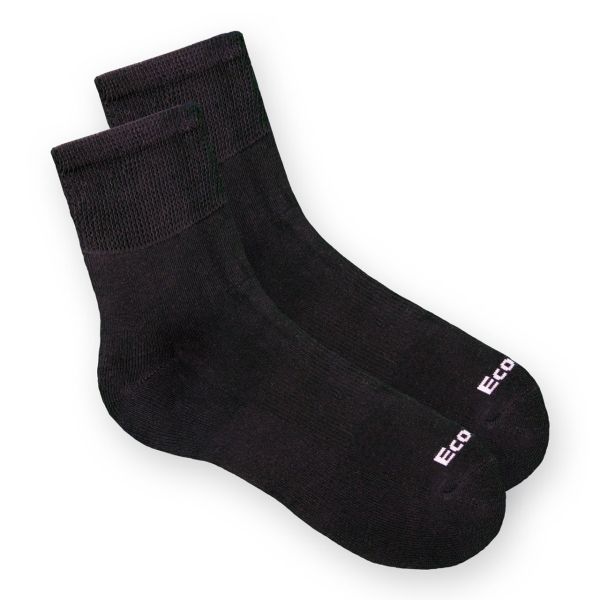Soft, Dry, & Clean
Soft as silk, dry as a desert, and odorless are three perfect descriptions of plant derived yarns spun from cellulose. Yarns derived from cellulose such as modal, lyocell, and viscose have a soft and buttery feel and can absorb 3-4 times as much moisture as cotton. The moisture management and breathability of these fibers remove sweat and moisture away from the skin where it can evaporate to help keep your skin dry and clean. Odor causing germs can not grow without moisture and the evaporation process helps keep keep your skin cooler in the summer and warmer in the winter. The next to skin smoothness reduces friction and helps prevent blisters in a sock. These performance attributes make these yarns ideal for socks.
Viscose from Bamboo
Bamboo viscose fibers are derived from one of the most ecologically friendly grasses on our planet, making it an attractive alternative to cotton and petroleum based fibers.

Viscose Fibers Can Absorb 3-4 Times as Much Moisture as Cotton!
Bamboo requires no irrigation as it thrives under natural rainfall and requires no pesticides or fertilizers. Once mature, it can grow up to 47-inches in a single day and holds the record as the world's fastest growing plant. Bamboo does not need to be re-planted after harvest as it is a grass and grows back from the cut.
A stand of bamboo creates 35% more oxygen than an equivalent stand of trees while absorbing 5-times the greenhouse gases. With so many uses, there is little to no waste with harvested bamboo, every part is used. The hard outer shell is used as a wood substitute and the inner pulp is what is used to create bamboo viscose.
Plant Based Cellulostic Fibers
Wood chips, bamboo, cotton scraps undergo a process where the plant cellulose is extracted, dissolved, and re-aligned into a fiber. While being man-made, the fiber is composed of long chains of cellulose molecules similar to silk. The molecular structure gives the yarn the desirable properties of being moisture wicking, breathable, and next to skin softness.
Advantages over Other Upcycled/Recycled Products
All forms of celluostic fibers whether it be viscose, modal, or lyocell all decompose rapidly in landfill conditions. A key differentiator from products derived from recycled plastics. We admire the re-use of plastics and it does save rersources and re-purposes plastics but those products will end up in landfills and they will not decompose.
The manufacturing of cellulose fibers does require more energy than processing of cotton fibers but one must consider the energy, pesticides, herbicides, irrigation, farmland utilization, and impact of planting and harvesting of cotton before it is processed into yarn when weighing environmental impact. The process of manufacturing cellulostic yarns isn't perfect but we believe it is several steps in the right direction and is continually improving.
In Review
- Soft and Comfortable
- Absorbs 60% more moisture than cotton
- Breathable for evaporation
- Complete natural product lifecycle - "From dust, To dust"
- Natural performance - No performance enhancing chemicals, metals, or conditioners
- Wood stock sourced from bamboo, sustainably managed forests, or upcycled scraps
Moso Bamboo
Ecosox are manufactured from bamboo viscose derived from Phyllostachys edulis (Moso bamboo). Moso bamboo is native to China and Taiwan, although it has been growing in the southern United States for over 100 years. Moso bamboo can grow over 90 feet tall. Known as bamboo tinder throughout China, Moso bamboo is also commonly used as a substitute to wood as it is much lighter, stronger, and cheaper to produce than traditional lumber.
What About the Pandas?
 Moso bamboo is inedible to Panda bears, so don't worry, we aren't depriving Pandas of their food. There are over 1,000 species of bamboo, of which Panda bears only consume 42. Fortunately for us, Pandas are picky eaters so when wearing Ecosox you won't have to worry about a Panda bear eating your feet any time soon.
Moso bamboo is inedible to Panda bears, so don't worry, we aren't depriving Pandas of their food. There are over 1,000 species of bamboo, of which Panda bears only consume 42. Fortunately for us, Pandas are picky eaters so when wearing Ecosox you won't have to worry about a Panda bear eating your feet any time soon.





